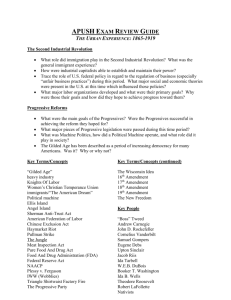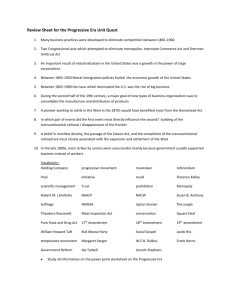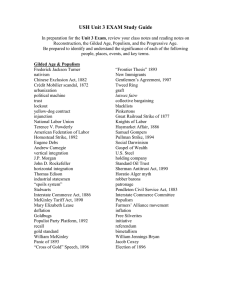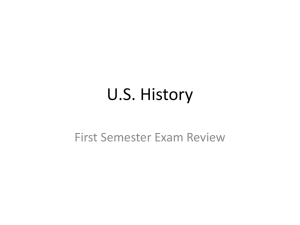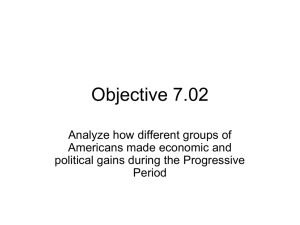Group 4: Gilded Age
advertisement
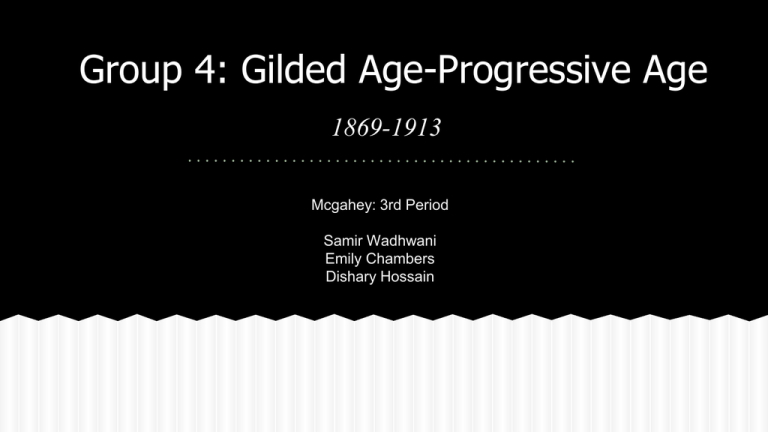
Group 4: Gilded Age-Progressive Age 1869-1913 Mcgahey: 3rd Period Samir Wadhwani Emily Chambers Dishary Hossain Presidents of the Gilded Age Ulysses S. Grant (1869-1877)- • • • • • • Republican Party 15th Amendment (1869)- Required states to enfranchise black men -- Ironically passed because Southern states were required to ratify Under Grant there were many Scandals going around without his knowing. Reason being, he was an impotent President. He was elected because he was a great War hero in the past war. *Credit Mobilier- Fraudulent Company that sold bonds in the Union Pacific Railroad for profits *Whiskey Ring- group of distillers that bribed federal officials and tax collectors to avoid paying millions of dollars in taxes on their product Grant’s presidency did not do much to change the breakdown in the south and reconstruction ended as a failure Presidents Continued Rutherford B. Hayes (1877-1881)- • • • • Republican Party Elected through a series of informal negotiations *Compromise of 1877- it was agreed that if Hayes won the presidency, then he would end military reconstruction and pull federal troops out of South Carolina and Louisiana, thus allowing Democrats to regain control over these states *Bland-Allison Act- Congress law enacted in order to buy and place silver into economy as silver dollars James A. Garfield (March 4-September 19, 1881)- • • • Republican Party Forgettable President Assassinated by Guiteau Presidents Continued Chester A. Arthur (1881-1885)- • • • Republican Party Civil Service Reform *Pendleton Act- created the Civil Service Commision in order to oversee examinations for potential government employees Grover Cleveland (1885-1889)- • • • • Democrat Party *Interstate Commerce Act- made in order to regulate the railroad industry; this industry became the first to be subjected to federal regulation *Knights of Labor- national labor union; 8-hour workday; equal pay; child labor laws; safety and sanitary codes; federal income tax; government ownership of railroad and telegraph lines *Haymarket Square Riot (1886)- labor protests in chicago that led to a bombing and killing of the police; about 8 people died there; considered a setback in labor movements Presidents Continued Benjamin Harrison (1889-1893)- • • • • Republican Party *Sherman Anti-Trust Act (1890)- first law made to limit monopolies; wanted to create a fairer competition in the workforce and wanted to limit and take-over’s of departments of merchandise *Mckinley Tariff (1890)- highest peacetime tariff; raised tariffs on agricultural products; in the end it hurt farmers financially *Birth of Populist Party during his presidency Presidents Continued Grover Cleveland (2nd term, 1893-1897)- • • • • • • Democrat Party *Panic of 1893- result of over speculation by investors that inflated the stock; passes the Sherman Silver Purchase act: amount of silver government had to pay increased *Hawaiian Incident (1893)- U.S troops intervened and toppled Queen Liliuokalani *Pullman Strike- railroad workers, led by Eugene Debs, upset on drastic wage cuts; Cleveland intervened by sending in federal troops *Wilson-Gorman Tariff (1894)- ineffective; first bill to introduce an income tax; later struck as unconstitutional *Venezuelan Boundary Dispute (1895)- boundary dispute between U.S and Britain over the boundary of Venezuela and Columbia; Britain won the dispute Presidents Continued William McKinley (1897-1901)Republican Party New Imperialism: directed towards finding access to resources, markets, and overseas investments; preferred expansion to European colonialism *Spanish-American War (1898-1899)- discussed in war slide *Open Door Policy (1899)- led from the war in the Philippines (discussed in war slide); allowed the major powers of Europe and the U.S to carve up China for an open-door policy of trade; John Hay asserted this policy • • • • Presidents of the Progressive Era Theodore Roosevelt (1901-1908)- • • • • • • • Republican Party *Square Deal- 3 C’s: 1) Control of corporations; 2) consumer protection’ 3) conservation of the United States’ natural resources *Venezuelan Debt Controversy (1902)- Europeans blocked all ports; U.S mediated a compromise *Dominican Republic Crisis (1902)- DR failed to pay European, so U.S took over the finances *Roosevelt Corollary (1904)- Result of the DR Crisis; allowed the U.S to exercise international police power in case of wrong-doing by a western hemisphere nation *Gentleman’s Agreement (1904)- Japan agreed to curb the number of workers coming to the U.S, and in return Roosevelt allowed the wives of Japanese men living in the U.S to join them *Hepburn Act (1906)- restricted railroad “free passes” and expanded the ICC; gave the ICC the ability to nullify existing rates and set maximum rates Progressive Era Continued Theodore Roosevelt Continued- • • • • • • • *Pure Food & Drug Act (1906)- first law passed to regulate manufacturing of food and medicines; it helped prohibit dangerous additives and inaccurate labeling *Meat Inspection Act (1906)- passed as a result to Upton Sinclair’s “The Jungle”; set standards in the meatpacking industry *Panama Canal (1903-1914)- allowed a quicker passage from the Pacific to the Atlantic; Panamanian Revolution allowed the U.S to build the canal Coal Strike (1902)- Roosevelt used his Square Deal* to solve this issue Elkins Act (1903)- strengthened the ICC by targeting the railroad practice of granting rebates to favored customers Using the Sherman Anti-Trust Act, he was well-known as “the trust buster” (i.e: Northern Securities Co) Conservation: conservation of natural resources; he set aside millions of acres as protected areas, included 6 national parks Progressive Era Continued William Howard Taft (1909-1913)- • • • • Republican Party “Dollar Diplomacy”- Emphasis on expanding and securing American commercial interests; tried to substitute dollars for American interests *Payne-Aldrich Tariff (1909)- bill to reduce tariffs; signing this bill outraged the progressives *Pinchot-Ballinger Controversy (1909)- Taft based the evidence of Pinchot as groundless; Pinchot then released the info of Ballinger turning over coal lands in Alaska for personal profit and tried to get Congress involved to investigate Wars Spanish-American War (1898)*President at the time: McKinley Causes1. Oppression of Cubans by Spain sparks a revolt 2. U.S business interests are threatened by the fighting 3. “Maine,” the battleship is blown up 4. Yellow press promotes anti-Spanish sentiment 5. Manifest Destiny Significance: U.S acquired foreign territory; becomes a world power; enforces the *Monroe Doctrine In the end, the terms of Treaty of Paris ended the Spanish-American War (discussed in treaty slide) Wars Continued After the Spanish-American War, Cuba had gained its independence. Here, the United States wanted to ensure that their economic interests wouldn’t further be threatened by Cuban administration. Therefore, the U.S. instituted the Platt Amendment. Platt Amendment stated: Cuba was not allowed to sign any foreign treaty without the consent of the United States; the U.S. could intervene in Cuban domestic and foreign affairs; the U.S. was allowed land on which to build a naval base and coaling system. Amendment was repealed in 1934 by FDR Treaties *Treaty of Paris- • • • • Ended the Spanish-American War Cuba was freed from Spain U.S. received Guam and Puerto Rico U.S. had to pay $20 Million for the Philippines *Hay-Bunau-Varilla Treaty (1903)- • • Treaty that established the Panama Canal Zone and the construction of it Signed by French Diplomat and John Hay (U.S. Secretary of State) Supreme Court Cases 1873- Slaughterhouse Cases: said 14th amendment ONLY applies to federal “privileges or immunities” NOT state citizenship rights (winner: states’ rights) 1875- U.S. vs Cruikshank: stated that the due process and equal protection clauses of the 14th amendment apply ONLY to government actions, not to individual actions. (winner: advocates of limited government) 1876- Munn vs Illinois: stated that the 14th amendment does not prevent Illinois from setting maximum rates for the storage of grain; railroad freight shipments. Private cos. had “public interest” which allowed regulation. (winner: state government and farmers) Court Cases continued 1883- Civil Rights Cases: stated that federal civil rights acts were unconstitutional (ex. desegregating public facilities). (winners- Racially discriminatory laws) ** this stood firm until the 1960s Civil Rights movement 1886- Wabash vs Illinois: said that Munn. State regulations of interstate commerce CANNOT place a direct burden on interstate commerce. (winner- federal government) ** led to the creation of the Interstate Commerce Commission 1895- In Re Debs: stated that the federal injunction ordering RR workers back to work during strike IS valid under the commerce clause. (winner- employers and corporations) Court Cases continued 1896- Plessy vs Ferguson: said that racially segregated facilities are permissible under the 14th amendment if they are equivalent (separate but equal). 1905- Lochner v US: stated that the NY state law limiting hours bakers could work IS invalid. (winners- employers and corporations) 1908- Muller vs Oregon: Said that law limiting hours IS valid based on women’s “nature,” this case contradicted the Lochner case. (winners- women, workers, progressive arguments) 1910- Standard Oil vs US: stated that the socialist anti-draft pamphlets were NOT protected by the 1st amendment **was a wartime case. (winner- federal government) this case created stronger anti-trust regulations • Gospel of Wealth • • • Carnegie’s theory that the wealthy have a duty to live responsible, modest lives and give back to society in any way that they can wealthy people should distribute their wealth to the good of the community rather than spend their money to satisfy their own selfish desires people must prove themselves to be morally responsible enough to be entrusted with society’s riches “ Godliness is in league with riches” - preached by Rockefeller who agreed with Carnegie’s concept and said “the good lord gave me my money” Social Darwinism definition: the social order is accounted as the product of natural selection of those persons best suited to existing living conditions. • • • • popularized in the US by William Graham Sumner applied Charles Darwin’s ideas about the natural world to social relations Sumner argued that government intervention would hinder the evolution of the human species (laissez-faire) idea of “survival of the fittest” Anarchism & Socialism • • Many Americans began to question the idea of capitalism and soon turned to different ideologies Anarchism: a political theory holding all forms of governmental authority to be unnecessary and undesirable and advocating a society based on voluntary cooperation and free association of individuals and groups (was used within the labor movement as well) Socialism: a way of organizing a society in which major industries are owned and controlled by the government rather than by individual people and companies (Socialist party of America founded by Eugene Debs in 1901) **both new types of ideology were seen as “dangerous” movements and were often over exaggerated; these ideas were also more embraced in Europe than in the US • Buildup of Big Business Robber Barrons→ men who controlled major industries in the U.S.; involved in cut throat business activities Vertical Integration→ Andrew Carnegie dominated the steel industry by investing in all aspects steel production (from mining to distribution) Horizontal Integration→ gaining a monopoly in an industry by establishing trusts (which involved working together with other companies rather than competing with one another); used by Rockefeller, the “oil baron” Rise of Nativism -After 1880 signaled a large influx of immigrants from eastern and southern Europe into urban regions in the U.S. *these “new immigrants” differed from the “old”, which mostly came from northern and western Europe *were less educated, came from non-democratic governments -conservatives feared that Anglo-Saxon America was committing a race suicide by letting “inferior races” enter the U.S. in large numbers. Led to: Chinese Exclusion Act (1882): only instance where a national group has been excluded from entrance into the U.S. by legislation immigrant quotas • • Progressive Movements *The middle class was primarily involved in this movement Women -Progressive era provided a means for women to be engaged in public issues like factory reform, giving aid to immigrants/poor, and child labor laws *what led to these opportunities: Jane Addams→ Settlement House Movement Quest for Efficiency -Progressives believed that expert management in the workplace and government could benefit society -believed that goals of expertise and efficiency would replace the corruption Foreign Policies China and the Open-Door policy: • • • • • China with its large population and big supply of natural resources became a huge target for the imperialists nations Britain, Japan, Germany, Russia, and France all had proclaimed a sphere of influence within China The United States wanting to get their foot in the door with the trade with china proposed the open door policy- all of China should be open to trade with all nations John Hay proposed this idea to the major powers and they all accepted eventually US claimed that they were concerned for the “ territorial integrity of China” when really were just interested in gaining a foothold in the race for trade with China Foreign Policies Dollar Diplomacy: idea of guaranteeing loans to foreign countries in order to further economic power was president Howard Taft’s foreign policy put an emphasis on expanding and securing American commercial interests rather than pursuing global strategic goals like Roosevelt with this Taft tried to substitute dollars for bullets in pursuing American interests (ex. sent troops to Nicaragua and the Dominican Republic to convince them into signing commercial treaties with the US • • • Foreign Policies Wilson’s Foreign Policy: Wilson was driven by a desire to secure American economic interests abroad and by a strong moral compass; these two desires often clashed sent troops to Haiti and the Dominican republic to ensure that American business interests were not being challenged • • • • Wilson declared that the United States hoped "to cultivate the friendship and deserve the confidence" of the Latin American states Wilson signed many bilateral treaties which agreed to “cooling off periods” rather than war Politics in the Gilded Age The Rise of Political Machines -politicians were controlled by bosses that had enormous influence over the government of urban cities. -Very corrupt, controlled tax rates, gave tax breaks to their allies and controlled prices and business, etc. -Stole millions from taxpayers using fraud and overinflation - Gave money to support businesses, immigrants, and the poor in return for their votes. Politics in the Gilded Age Republicans and Democrats *Both were more focused on gaining support from trusts and industrials rather than the needs of farmers, workers, or urban poor *Neither party took the initiative to deal with huge issues like… -child labor/safety of the workplace/abuses of RR industry -rights of African Americans -women’s suffrage *Both wanted “sound currency” and supported the status quo in the existing financial system *Both parties were affiliated w/ big business. Owners of major companies offered bribes, gifts, and contributions to congressmen *Scandal and Corruption (local, federal level) *Republicans split into the… -Stalwarts: supported the reelection of Ulysses S. Grant; most were from the South; were in favor of political machines and spoils system -Half-breeds: were in favor of civil service reform and a merit system; led by Senator James G. Blaine -Republicans who supported Democratic candidate Grover Cleveland in the election of 1884 The Rise of Third Parties How did farmers rise to a political platform? Cause -RR companies were overcharging farmers for carrying produce to distant places -tight supply of currency in the U.S. made it difficult for farmers to pay off debt and drove down the prices of their crops -banks were foreclosing on farms ***Effect: These problems drove farmers to seek solutions thru direct political action Third Parties: Gilded Age The Greenback Party (1878) -founded after the Panic of 1873 -advocated issuing paper money that wasn’t packed by gold or silver -got a million votes in the 1878 congressional elections, but the party later disbanded Populist Party (1892) PLATFORM -wanted increased democracy -a graduated income tax -gov ownership of the RR, telegraph, and telephone line -free coinage of silver -direct election of senators -initiative→ voters can ask the legislature to consider a specific bill -referendum→ voters can enact a law or express their views on a proposal -recall→ voters can remove a public official from office if they have enough signatures Third Parties in the Gilded Age Populist Party, ctd. ****made solid gains in the midterm election of 1894 (elected 6 senators and 7 representatives from farming regions in the south/west) ****were the most successful third party in the 19th century BUT their popularity=short lived bc farmers’ conditions improved in the 1890’s and their political agenda was absorbed by major political parties Progressive Era Politics -Spanned from the period 1900-1920 and the presidencies of Theodore Roosevelt (Rep.), William Howard Taft (Rep.), and Woodrow Wilson (Dem.) -believed in progress/reformed institutions that would replace corrupt power -stressed science and efficiency -viewed government as a creator of an orderly, improved society; govt had the power to combat special interests for the good of the nation -politicians believed the power of corrupt government could be diminished by increasing power of the people and putting more power in the hands of nonpartisan professional officials -progressives incorporated many of the Populist demands (such as referendum, initiative, and direct election) ***we will see how in the “Amendments” slide The Progressive Party -Party of Roosevelt supporters formed this party during the election of 1912 PLATFORM: -lower tariffs -woman suffrage business regulation -abolition of child labor -8-hour workday workers compensation -direct primaries (where voters choose party nominees) -popular election of senators Limits of Progressive Reform While the movement did put forth many ideas regarding the improvement of society, there were two issues Persistence of White Supremacy ****progressives ignored the plight of African Americans Southern States had Jim Crow Laws, segregating blacks from whites in public facilities; voting laws and intimidation excluded blacks from voting despite the passage of the 15th Amendment (which outlawed the denial of the right to vote based on race) violence (KKK) all of these injustices led to the formation of the NAACP by W.E.B. Du Bois, who called for full political equality and civil rights; this type of activism was different than Booker T Washington’s, who accepted segregation as an opportunity for blacks to acquire skills and rise in society • • • • Radical Alternatives many working class Americans felt that the progressive movement didn’t go far enough to remove the malices of capitalism→mobilized support for more radical agendas in the twentieth century (ex: socialism) • Amendments of the Time Period ⇒ “Progressive Amendments” ⇐ 16th Amendment *gave Congress the power to tax incomes 17th Amendment *established the direct election of senators (instead of being chosen by state legislatures 18th Amendment (1919) *outlawed manufacture, sale, transport of alcoholic beverages *Support from Anti-Saloon League, Women's Christian Temperance Union, churches 19th Amendment (1920) *women’s suffrage Famous Publications: Gilded Age Rags-to-Riches Stories *Horatio Alger wrote “dime” novels that featured a poor boy who achieved success through luck as well as hard work. Henry George’s Progress and Poverty (1879) *criticized the resources, especially land, controlled by the wealthy elite. *wanted a single tax on land values, which he thought would create a fair society Edward Bellamy’s Looking Backward (1888) *novel is about a man who falls asleep in 1887 and wakes up in 2000 to find socialist society *significance: shows how many Americans began to question capitalism becauses of the inequalities and poverty of the Gilded Age----> began to embrace socialism Yellow Journalism & The Gilded Age *printing costs went down+literacy went up=increased news circulation during the Gilded Age *popular newspapers: Joseph Pulitzer’s New York World William Randolph Hearst’s New York Journal ^ gained popularity through exaggerated coverage of news; known for their bold, dramatic headlines Why is this so important? -played a huge role in pushing public opinion toward support for the Spanish American War (1898) Publications of the Progressive Era Muckrakers and the Rise of Investigative Journalism -Progressives who used mass print to make the public aware of social problems and inspire action were known as muckrakers -most of the articles shed light on corruption and scandal (especially on businesses/politics) -Important “Muckraking” magazines→ McClure’s, Harper’s, Cosmopolitan; became very popular in middle class homes -Important Muckrakers: *Upton Sinclair *Ina Tarbell *Lincoln Steffans *Frank Norris Publications of the Progressive Era: Ctd The Jungle -novel takes place in Chicago -Upton Sinclair depicted the unsanitary and outright dangerous conditions of the meatpacking industry (soiled meat, missing parts of the body--such as a severed finger--were found on the machines, rat droppings, etc) IMPACT: created a public outcry→ led Congress to pass the Meat Inspection Act (1906) and the Pure Food and Drug Act (1906), which helped to establish the Food and Drug Administration History of the Standard Oil Company -Ida Tarbell detailed the rise of Standard Oil Company (a huge trust formed by John D. Rockefeller) in McClure’s Magazine and The History of the Standard Oil Company (1904) -exposed the ruthlessness of Rockefeller’s company→ contributed to the government breaking up the Standard Oil Trust in 1911 Technology • • • • • • • • • During the Gilded Age, the nation was rapidly expanding its economy First Continental Railroad: opened up far-west mining and ranching regions; quicker travel from east to west; linked larger markets Air Brakes for Trains Brooklyn Bridge American Telephone and Telegraph Company Induction Motor-use of alternating current feasible General Electric- Thomas Edison (Lightbulb) Kerosene Standard Oil Company
